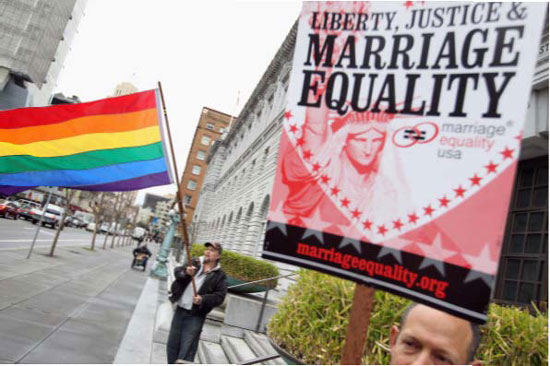In 1967 the Supreme Court ruling on Loving v. Virginia went a long way toward making marriage a right that more Americans could exercise. In Loving, the court decided that laws prohibiting African Americans and white Americans from marrying violated the Constitution. The Loving ruling said, among other things, “Marriage is one of the ‘basic civil rights of man,’ fundamental to our very existence and survival.”
Today, 45 years later, another group of Americans is struggling for the right to marry. In state after state, gay men and lesbians have engaged in legal struggles to be included among those who are free to exercise this basic civil right.
As educators look for ways to talk about The Loving Story and marriage equality in class, here is some additional information that can be added to those discussions.

Getty Images
The struggle for marriage equality has won some key victories lately. Today same-sex couples can legally marry in seven states and the District of Columbia. Washington State legalized same-sex marriage this week.
There have also been some key losses—at times following closely on the heels of those victories. California’s reversal on same-sex marriage (legalizing it, then barring it) may be the best known, but New Hampshire is facing the possibility of a similar turnaround. Last week in California, a Circuit Court of Appeals ruled that the state's ban on same-sex marriage is unconstitutional. The ruling is now on hold pending an appeal.
As I write this, New Hampshire’s marriage equality law is under siege. Opponents have recently introduced House Bill 1264, which would essentially legalize discrimination against same-sex couples. It says:
Notwithstanding any other provision of law, no person, including a business owner or employee thereof, shall be required to provide services, accommodations, advantages, facilities, goods, or privileges to an individual if the request is related to the solemnization, celebration, or promotion of a marriage and providing such services, accommodations, advantages, facilities, goods, or privileges would be a violation of the person’s conscience or religious faith.”
In other words, decades after the civil rights movement, New Hampshire is considering a law that legalizes discrimination—as long as you really, really believe in the bigoted ideas behind your behavior.
That’s alarming. When Mildred and Richard Loving were convicted of violating Virginia’s anti-miscegenation law, presiding judge Leon Bazile cited his religious beliefs to justify the conviction. He wrote, “Almighty God created the races and he placed them on separate continents. And, but for the interference with his arrangement, there would be no cause for such marriage. The fact that he separated the races shows that he did not intend for the races to mix.” Clearly Bazile’s religious beliefs shaped his ruling—and the Supreme Court clearly stated that guarantees of basic civil rights trumped the judge’s beliefs.
The outcry against HB 1624, including the governor’s promise to veto it, is gratifying.
But the situation in New Hampshire reminds us that history is not a straight line of progress. It’s filled with twists and turns. As Martin Luther King Jr. wrote, “With initial success, every social revolution simultaneously does two things: It attracts to itself fresh forces and strength, and at the same time it crystallizes the opposition.”
As the marriage equality movement gains strength and succeeds in big states like New York, we can expect more pushback. Teachers need to be ready. That pushback is likely to come from many students, parents and even other educators. But that’s a sign of our success and a challenge to continue the struggle.
Weiss is a curriculum writer who lives in Maine. She is co-author of the teacher’s guide for The Loving Story.